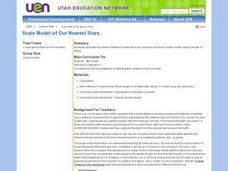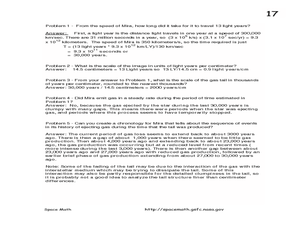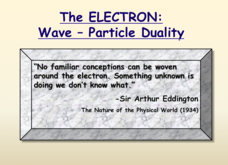101 Questions
Speed of Light
How quickly does light travel long distances? A short video simulates light going from the earth to the moon at two different paces. Scholars relate the distance to the rate to understand which simulation is correct.
University of Colorado
Spacecraft Speed
Space shuttles traveled around Earth at a speed of 17,500 miles per hour, way faster than trains, planes, or automobiles travel! In the 13th installment of 22, groups graph different speeds to show how quickly spacecraft move through...
Curated OER
Light
For this light worksheet, students read what makes light, the speed of light, and the electromagnetic spectrum. Students complete 12 matching, 8 fill in the blank, and 9 word problems.
Curated OER
Scale Model of Our Nearest Stars
Sixth graders calculate a light day, light hour, and light minute from the standard of a light year. After establishing the distances, a one meter scale is created to demonstrate the distance between the sun and the planets of our solar...
Curated OER
Distances in Space
In this distances in space worksheet, students learn about astronomical units and light years as measurements for great distances. Students use both of these units of measurements to solve five problems.
Curated OER
Stars
In this stars learning exercise, students determine if 15 statements about stars, constellations, Polaris, light years and the position of the stars are true or false. If they are false, students change the italicized word in the...
Curated OER
Working With Scientific Notation
In this scientific notation activity, students read about the discovery of new planets. They use scientific notation to identify the number of miles from one planet to the next. Students determine how long it would take to travel, when...
Alabama Learning Exchange
Cosmic Measurements
Learners develop two units of measurement to relate to the astronomical unit and the light year. In this astronomy lesson, students use a Twizzler to develop a measurement unit similar to the astronomical unit. They use a moving object,...
Curated OER
Sun and Shadows
Why do shadows look different in the summer than in the winter? What causes day and night? How can a sundial be used to tell time? Answer these questions and more through two engaging lessons about light and shadows. Fourth and fifth...
Curated OER
Factor Conversion
In this factor instructional activity, students practice doing factor conversions of time, length, speed, and weight. This instructional activity has 12 word problems to solve.
Curated OER
A Star Sheds a Comet Tail!
In this comet tails and stars worksheet, students read about the star Mira and the vast clouds of gases it emits. They use a photograph from the Galaxy Evolution Explorer satellite to solve 5 problems about the scale of the image, the...
Curated OER
Hubble Sees a Distant Planet
In this Hubble telescope worksheet, students solve 4 problems about the image of the distant planet the Hubble telescope discovered. Students determine the distance the planet was from its star in 2006, they determine the planet's...
Curated OER
Physical Setting: Physics Exam 2004
Twelve pages of mostly multiple-choice questions comprise this comprehensive New York Regents physics exam. It covers an entire year's worth of physics curriculum and requires about three hours for completion. Review the questions to...
Curated OER
Deep Impact Comet Encounter
Physics apprentices analyze the impact of NASA's Impactor as it collided with the comet Tempel 1 in July of 2005. They calculate the mass and speed of the comet, along with the distance it might drift off of its orbit over time. This...
Curated OER
In a Galaxy Far, Far, Far Away
Sixth graders compare distances between objects in the solar system. They investigate how light years are measured and when using them to measure how distances compare with one another. They write an essay exploring the possibility of...
Glynn County School System
Multi-Wavelength Astronomy
Take a look at astronomy through the light lens. From radio to gamma, light waves exist in every corner of the universe. An enlightening PowerPoint presentation gives an overview of the different categories of light and then discusses...
Curated OER
Light
In this light worksheet, students match 12 terms related to light and the electromagnetic spectrum to their definitions, they order waves by their speed, they analyze the energy and wavelengths of the electromagnetic spectrum and they...
Curated OER
Lights in the Night Sky
Students read about and explore solar winds and spectacular auroras, specifically the Aurora Borealis, also known as the Northern Lights.
University of Texas
Lives of Stars
Stars exist from a few million years to over 10 billion years, depending on their mass. Scholars perform a play acting as stars to learn about their different life cycles. They develop an understanding of many of the fundamental concepts...
Curated OER
TE Lesson: Navigating at the Speed of Satellites
Learners study the basic concepts of the Global Positioning System and how it increases the accuracy of navigation. They examine trilateration and how the speed of light is used to calculate distances.
Curated OER
Lighting Our Way
Students read a variety of web-based articles to explore the history of human understanding of light. They investigate light waves and read about the work of Albert Einstein.
Curated OER
Innovation: Light Speed
Get your scholars working at "light speed" with this worksheet on how different wave frequencies have been discovered and used. The assignment has 20 short-answer questions, set up in a table. Consider re-doing the table or allowing...
Mr. E. Science
Motion
An informative presentation covers motion, metric system, conversions, graphing of coordinates and lines, speed, velocity, and acceleration problems, as well as mean calculations. This is the first lesson in a 26-part series.
Science Geek
The Dual Nature of the Electron
Why don't atoms collapse? Scientists debated this concept for years before they understood the dual nature of the electron. Presentation discusses the electron as both a particle and an energy wave. It also relates these concepts to the...

























